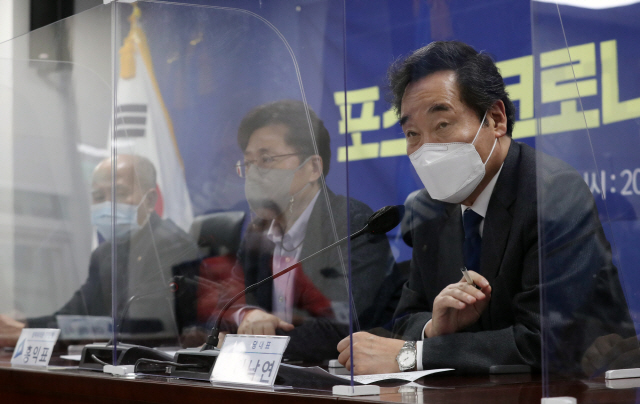■Nak-Yeon Lee’Profit Sharing My Way’
The party government shouted’form consensus first’
Company imprisonment due to ESG disclosure obligation
The ruling party is also concerned about “approach carefully”
Strong “anti-market” dissatisfaction in management
 viewer
viewer
“The corona benefit-sharing system is voluntary. It is advisable to discuss it after the public consensus is formed.” (Prime Minister Jeong Sye-gyun)
“I hope that the principle is to promote the voluntary participation of the private sector.” (Lee Nak-yeon, Representative of the Democratic Party)
Despite the recent remarks of President Lee and Prime Minister Jung, who represent the Party’s political party, the democratic party’s profit-sharing system is actually unfolding in the form of a’corporate arm twist’. On the 15th, a new topic within the Democratic Party was’employment of early disclosure of corporate environment, society and governance (ESG)’. Sighs poured out from the business world, which had put an expectation on the Party’s repeated policy of’voluntary participation’. An official in the business community pointed out, “The word that the ESG disclosure will be used for the implementation of the profit-sharing system is the same as saying that we will induce’deterring participation’ through the so-called’disgrace cycle’.” In addition, the Democratic Party is expected to intensify the pressure to implement the profit-sharing system in the near future, targeting platform operators such as Kakao Pay and Baedal People, large corporations such as Samsung and LG, and credit card companies.
◇ Aiming at the platform industry, such as Bae Min, at the first meeting of the Post Corona Inequality Relief Task Force (TF) held at the National Assembly on this day, Lee announced a policy to utilize the ESG disclosure system to implement the profit-sharing system. It seems Lee’s judgment that if the ESG disclosure is made early, companies will be more active in implementing the profit-sharing system.
At the meeting, the policy direction was also discussed. The Democratic Research Institute reported three profit-sharing models and each overseas case: a traditional profit-sharing model, a platform-partner cooperation model, and a social fundraising model. First, the case of Rolls-Royce in England was introduced as a traditional profit-sharing model. The researcher explained that Rolls-Royce signed a strategic partnership with six partners and decided to distribute the sales generated over the next 30 years in proportion to the amount of investment. Based on these examples of the Democratic Party, it is expected to emphasize the participation of large corporations.
As for the platform-partner cooperation model, major delivery application companies such as Doordash and Grubhub in the United States and platform companies such as Apple and Amazon recently temporarily reduced or exempted fees were mentioned. This suggests that the reduction of fees for the people of delivery and Kakao Pay could be the main method of the profit sharing system. Earlier, Lee said on the 13th, “If platform companies and self-employed companies increase their profits through joint efforts, they will be able to share profits by raising the margins of the self-employed or cutting fees.” At the closed meeting on that day, it was reported that even the credit card companies that benefited from the disaster subsidies should share the profits. As a social fundraising model, a case in which a French insurance company donated 200 million euros (about 260 billion won) last year was introduced. The Democratic Party is planning to promote the legislation necessary to implement the benefit-sharing system at the extraordinary National Assembly in February.
◇野 Strong repulsion… Someone’s concerns = The power of the people is clearing the opposition to the benefit-sharing system promoted by the Democratic Party. Ho-young Joo, head of the People’s Power, said, “We will take back profits by twisting the arms of the economic agents.” He criticized, “The job should be made by companies and the private sector, but we are trying to do a profit-sharing system by tying our hands and feet with various regulations.”
Criticism about the implementation of the benefit-sharing system also comes from some of the ruling party. A member of the ruling party said, “Everyone agrees with the awareness that the polarization is intensifying due to the novel coronavirus infection (Corona 19),” he said. “But I am not sure if the benefit-sharing system is the answer. I think a more careful approach is needed.”
◇Management, strong dissatisfaction with anti-market policy = The management community is highly concerned about the profit-sharing system, which the Democratic Party took a full-scale drive. Prime Minister Chung and Lee also said they would not force companies to share profits, but the management community believes that there is a high possibility of being a de facto anti-force. This is because the Democratic Party, which can make various regulatory bills alone, and the Fair Trade Commission and Financial Committee, which are regulatory and supervisory agencies, have no choice but to see.
In the management world, complaints about whether it is too much to do it are pouring out. An official of an economic organization said, “The business environment is not easy due to the 3rd Corporate Regulation Act and the Act on Punishment for Severe Accidents. Even if they accept it and make a decision to share the profits, who will be responsible at that time if they are sued for malpractice.”
An official from a large company said, “Some companies are doing well amid the Corona 19 crisis, but they are not investing in stocks or real estate, but profits from maintaining core businesses.” “It’s to break the morale of the company.”
/ Reporter Jihoon Lim, Hanshin Park, Heeyoon Jeon [email protected]
< 저작권자 ⓒ 서울경제, 무단 전재 및 재배포 금지 >
